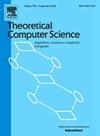Full-grained proxy re-encryption for all circuits
IF 1
4区 计算机科学
Q3 COMPUTER SCIENCE, THEORY & METHODS
引用次数: 0
Abstract
In this paper, we proposed a new concept called Full-Grained PRE (FG-PRE) to which a function set is attached. With FG-PRE, a delegator authorizes the proxy a full-grained re-encryption capability for with a single re-encryption key . Then, the proxy can use this single re-encryption key to transform encrypting message m for delegator i into an re-encrypted ciphertext encrypting with arbitrary for delegatee j. Thus, the proxy has a full-grained (w.r.t. ) control of the information that can be transmitted to the delegatee j. This is in sharp contrast to fine-grained PRE (Zhou et al. ASIACRYPT 2023), which has to generate different re-encryption keys to support different functions. In their fine-grained PRE, the number of re-encryption keys generated by delegator and stored by the proxy for is linear to the size . With our full-grained PRE, a single re-encryption key suffices.
We formalize the syntax of FG-PRE and define security (security under honest re-encryption attack) and function private security () for FG-PRE. Compared to the security (Zhou et al. ASIACRYPT 2023) and the security (Zhou et al. PKC 2024) defined for the fine-grained PRE, our security not only allows adversary to obtain re-encryption keys from honest users to corrupted users, but also has an enhancement: we even allow the adversary to query full-grained re-encryptions with f for the challenge ciphertext under the condition . We construct a FG-PRE scheme for bounded linear function , enjoying single-hop, unidirectional and non-interactive properties. Our scheme achieves the security and security and can be tightly reduced to the eDBDH assumption.
Furthermore, we extend our scheme to a new FG-PRE scheme , supporting all circuits of bounded-size with the help of randomized encoding technique. We prove that our scheme also has security and security. With our scheme, the proxy is able to use a single re-encryption key to convert ciphertext under any circuit of polynomial-bounded size.
所有电路的全粒度代理重新加密
在本文中,我们提出了一个新的概念,称为全粒度预(FG-PRE),它附加了一个函数集F。使用FG-PRE,委托方使用单个重加密密钥rki→j向代理授权F的全粒度重加密功能。然后,代理可以使用这个单一的重新加密密钥将ct(i)对委托i的加密消息m转换为对委托j的任意f∈f的重新加密密文ct(j)对f(m)进行加密。因此,代理对可以传输给委托j的信息具有全粒度(w.r.t.f)控制。这与细粒度PRE (Zhou等)形成鲜明对比。ASIACRYPT 2023),它必须生成不同的重加密密钥来支持不同的功能。在它们的细粒度PRE中,由委托生成并由代理为F存储的重加密密钥的数量与大小|F|呈线性关系。对于我们的全粒度PRE,一个重新加密密钥就足够了。我们形式化了FG-PRE的语法,定义了FG-PRE的HRA安全(诚实重加密攻击下的安全)和功能私有HRA安全(FP-HRA)。与CPA安全相比(Zhou et al.;ASIACRYPT 2023)和HRA安全性(Zhou等。PKC 2024)定义的细粒度PRE,我们的HRA安全性不仅允许攻击者从诚实用户到损坏用户获取重加密密钥,而且还有一个增强:我们甚至允许攻击者在条件f(m0)=f(m1)下使用f查询全粒度重加密以获取挑战密文。本文构造了有界线性函数Flin的FG-PRE方案FG-PRElin,该方案具有单跳、单向和非交互的性质。我们的方案实现了HRA安全性和FP-HRA安全性,并可以严格地约简到eDBDH假设。此外,我们将FG-PRElin方案扩展为新的FG-PRE方案FG-PRE电路,利用随机编码技术支持所有有界大小的电路。我们证明了我们的FG-PRE电路方案同样具有HRA安全性和FP-HRA安全性。使用我们的FG-PRE电路方案,代理能够在任何多项式有界的电路下使用单个重加密密钥来转换密文。
本文章由计算机程序翻译,如有差异,请以英文原文为准。
求助全文
约1分钟内获得全文
求助全文
来源期刊

Theoretical Computer Science
工程技术-计算机:理论方法
CiteScore
2.60
自引率
18.20%
发文量
471
审稿时长
12.6 months
期刊介绍:
Theoretical Computer Science is mathematical and abstract in spirit, but it derives its motivation from practical and everyday computation. Its aim is to understand the nature of computation and, as a consequence of this understanding, provide more efficient methodologies. All papers introducing or studying mathematical, logic and formal concepts and methods are welcome, provided that their motivation is clearly drawn from the field of computing.
 求助内容:
求助内容: 应助结果提醒方式:
应助结果提醒方式:


